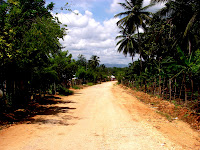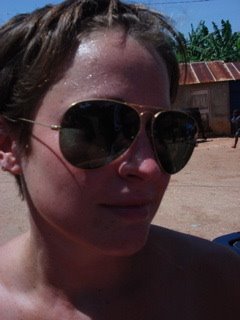 The village of El Yayal and its surrounding communities is located around the Loma Guaconejo Natural Reserve, approximately 30 kilometers outside of the town of Nagua. The population of El Yayal is approximately 300 people, containing roughly 100 homes. The people residing in these communities depend completely on agriculture and animal husbandry as their source of income, farming mainly cocoa, coconut and fruit and raising cattle, chickens, and pigs. The majority of the men work the fields while the women spend most of their time cooking, washing clothes and looking after the house and children.
The village of El Yayal and its surrounding communities is located around the Loma Guaconejo Natural Reserve, approximately 30 kilometers outside of the town of Nagua. The population of El Yayal is approximately 300 people, containing roughly 100 homes. The people residing in these communities depend completely on agriculture and animal husbandry as their source of income, farming mainly cocoa, coconut and fruit and raising cattle, chickens, and pigs. The majority of the men work the fields while the women spend most of their time cooking, washing clothes and looking after the house and children.
Within these communities there are a few associations working towards community development. Both the Catholic and Evangelical churches in El Yayal are active contributors to the community, working on road improvement projects, child registration initiatives, and school improvements. Within the Catholic Church there is also a Directiva de Vecinos (neighborhood outreach) that makes sure all members of the community are well informed and able to participate in church and community activities. Each community also has a Club de Madres (mothers’ group) of 25 women who meet once a week to discuss community problems and to try and come up with solutions. Previous projects these groups have worked with are organic farming, small business development, and community aqueducts. They also devote a considerable amount of time to raising money for church improvements and to provide financial assistance for needy members of the community.
group) of 25 women who meet once a week to discuss community problems and to try and come up with solutions. Previous projects these groups have worked with are organic farming, small business development, and community aqueducts. They also devote a considerable amount of time to raising money for church improvements and to provide financial assistance for needy members of the community.
Within the community many parents have expressed concern about the increasing level of disease and health problems rising in the community. There is a high level of kidney problems, diabetes, high blood pressure, anemia, parasitic, and respiratory problems in the area, not only according to the community members but also according to the local nurse who runs the community health clinic. The lack of knowledge about dietary needs, nutritional balance, water sanitation and antibacterial cleaning practices can lead to many of the previously mentioned problems and imposes unnecessary health risks on all community members. Consequently, the quality of life in El Yayal is suffering on many levels.
to the community members but also according to the local nurse who runs the community health clinic. The lack of knowledge about dietary needs, nutritional balance, water sanitation and antibacterial cleaning practices can lead to many of the previously mentioned problems and imposes unnecessary health risks on all community members. Consequently, the quality of life in El Yayal is suffering on many levels.
Currently, of the 104 houses in El Yayal, 33% do not have latrines and of the houses that do have latrines, only 27% are in fair or good condition.
Another problem brought up by the women in the area is that few families within El Yayal and the surrounding communities have propane stoves. Those who do own them are restricted by their lack of income and the remote location and the scarcity and high cost of propane. Therefore, the majority of families cook over outdoor stoves. These stoves are either pits made of clay or three cemented blocks raised up on a table. They use a significant amount of firewood, requiring members of the family to spend an average of one and a half hours daily looking for firewood. Due to this high demand of wood, many trees are being cut down, contributing to the deforestation of the area and the threat to the local watershed. Cooking over these fires three times a day, women are inhaling smoke equivalent to smoking 10 cigarettes daily. Amongst major complaints from those who cook
within El Yayal and the surrounding communities have propane stoves. Those who do own them are restricted by their lack of income and the remote location and the scarcity and high cost of propane. Therefore, the majority of families cook over outdoor stoves. These stoves are either pits made of clay or three cemented blocks raised up on a table. They use a significant amount of firewood, requiring members of the family to spend an average of one and a half hours daily looking for firewood. Due to this high demand of wood, many trees are being cut down, contributing to the deforestation of the area and the threat to the local watershed. Cooking over these fires three times a day, women are inhaling smoke equivalent to smoking 10 cigarettes daily. Amongst major complaints from those who cook include irritated eyes, headaches, lung problems, chest pains, cough and dizziness. Therefore, these traditional stoves pose a threat not only to the environment but also contribute to the worsening health of those around them.
include irritated eyes, headaches, lung problems, chest pains, cough and dizziness. Therefore, these traditional stoves pose a threat not only to the environment but also contribute to the worsening health of those around them.
My work in El Yayal as a Peace Corps volunteer focuses on two projects in direct response to these health concerns, VIP (Ventilated Improved Pit) latrines to address the lack of adequate sanitation facilities in the community, and Improved Ceramic Woodburning Cookstoves to address many of the common health concerns. The community is contributing 35% of the total project costs in the form of labor and raw materials. The Women’s Group of El Yayal initially presented the projects to the community and will oversee the construction and education related to the projects. The committee will also address any problems related to the project and will organize the solicitation of any funds needed for maintenance or new beneficiaries.
latrines to address the lack of adequate sanitation facilities in the community, and Improved Ceramic Woodburning Cookstoves to address many of the common health concerns. The community is contributing 35% of the total project costs in the form of labor and raw materials. The Women’s Group of El Yayal initially presented the projects to the community and will oversee the construction and education related to the projects. The committee will also address any problems related to the project and will organize the solicitation of any funds needed for maintenance or new beneficiaries.
Each VIP Latrine and Ceramic Cookstove cost approximately US$100.00 a piece. For US$100.00, a family in El Yayal will have the capacity to alleviate many of the ailments that they have come to accept as an inescapable reality. Please consider donating whatever you are able to our project. All donations are tax-deductible and easily processed electronically through the Peace Corps website. Follow this link for more information:
approximately US$100.00 a piece. For US$100.00, a family in El Yayal will have the capacity to alleviate many of the ailments that they have come to accept as an inescapable reality. Please consider donating whatever you are able to our project. All donations are tax-deductible and easily processed electronically through the Peace Corps website. Follow this link for more information: https://www.peacecorps.gov/resources/donors/contribute/projdetail.cfm?projdesc=517-230®ion=carib
https://www.peacecorps.gov/resources/donors/contribute/projdetail.cfm?projdesc=517-230®ion=carib
 The
The 




 latrines to address the lack of adequate sanitation facilities in the community, and Improved Ceramic Woodburning Cookstoves to address many of the common health concerns. The community is contributing 35% of the total project costs in the form of labor and raw materials. The Women’s Group of El Yayal initially presented the projects to the community and will oversee the construction and education related to the projects. The committee will also address any problems related to the project and will organize the solicitation of any funds needed for maintenance or new beneficiaries.
latrines to address the lack of adequate sanitation facilities in the community, and Improved Ceramic Woodburning Cookstoves to address many of the common health concerns. The community is contributing 35% of the total project costs in the form of labor and raw materials. The Women’s Group of El Yayal initially presented the projects to the community and will oversee the construction and education related to the projects. The committee will also address any problems related to the project and will organize the solicitation of any funds needed for maintenance or new beneficiaries.



No comments:
Post a Comment